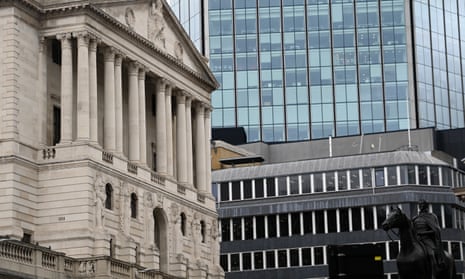The UK’s annual inflation could go as high as 15% by the start of 2023, experts have forecast, as further sharp increases in energy prices push up the cost of living.
On the eve of the latest decision on interest rates by the Bank of England, the Resolution Foundation thinktank said price pressures were likely to be stronger and last longer than the Bank had previously forecast.
The Bank’s monetary policy committee – which said in June that it expected inflation to peak at just over 11% in October – is poised to raise official borrowing costs on Thursday for a sixth successive month despite signs that the economy is weakening.
The latest monthly health check of the service sector from S&P Global and the Chartered Institute of Procurement and Supply found activity among private firms operating in the service sector has fallen to its lowest level since the winter lockdown of early 2021.
Tim Moore, economics director at S&P Global Market Intelligence, said: “Reduced levels of discretionary consumer spending and efforts by businesses to contain expenses due to escalating inflation have combined to squeeze demand across the service economy.
“The near-term outlook also looks subdued, as new order growth held close to June’s 16-month low and business optimism was the second weakest since May 2020.”
The Resolution Foundation pointed to some good news on inflation, as some commodity prices fell, including oil, but this was being more than offset by the rising cost of gas. As a result, the UK’s annual energy price cap is now predicted to go up from just under £2,000 to about £3,500 when the new figure for October is announced at the end of the month.
Jack Leslie, senior economist at the Resolution Foundation, said: “The outlook for inflation is highly uncertain, largely driven by unpredictable gas prices, but changes over recent months suggest that the Bank of England is likely to forecast a higher and later peak for inflation – potentially up to 15% in early 2023.
“While market prices for some core goods – including oil, corn and wheat – have fallen since their peak earlier this year, these prices haven’t yet fed through into consumer costs and remain considerably higher than they were in January.”
In its annual assessment of the UK, the Organisation for Economic Cooperation and Development (OECD) said a strong post-pandemic recovery was coming to an end and the economy was facing slower growth with rising inflation and labour shortages.
Mathias Cormann, the secretary general of the OECD, said: “Like other economies around the world, the UK economy faces a number of headwinds, with pre-existing structural challenges magnified by the pandemic and Russia’s war of aggression against Ukraine.
“The key to stronger economic growth and better opportunities will be stronger growth in productivity.”
